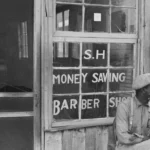Print A young man sits outside a small, discount barber shop in Natchez, Mississippi. 1935. Three decades ago, few economists would speak against free trade or automation. Those who raised concerns about job displacements were met by replies that price reductions would compensate in the short run while higher incomes elsewhere in the economy meant new (and better) opportunities for everyone in the medium-run.
This is no longer the case. Many economists, most notably Nobel laureate Angus Deaton , have soured on free trade and automation. They argue that “big shocks,” like the rapid expansion of China (and its significant […]
Full Post at www.aier.org
